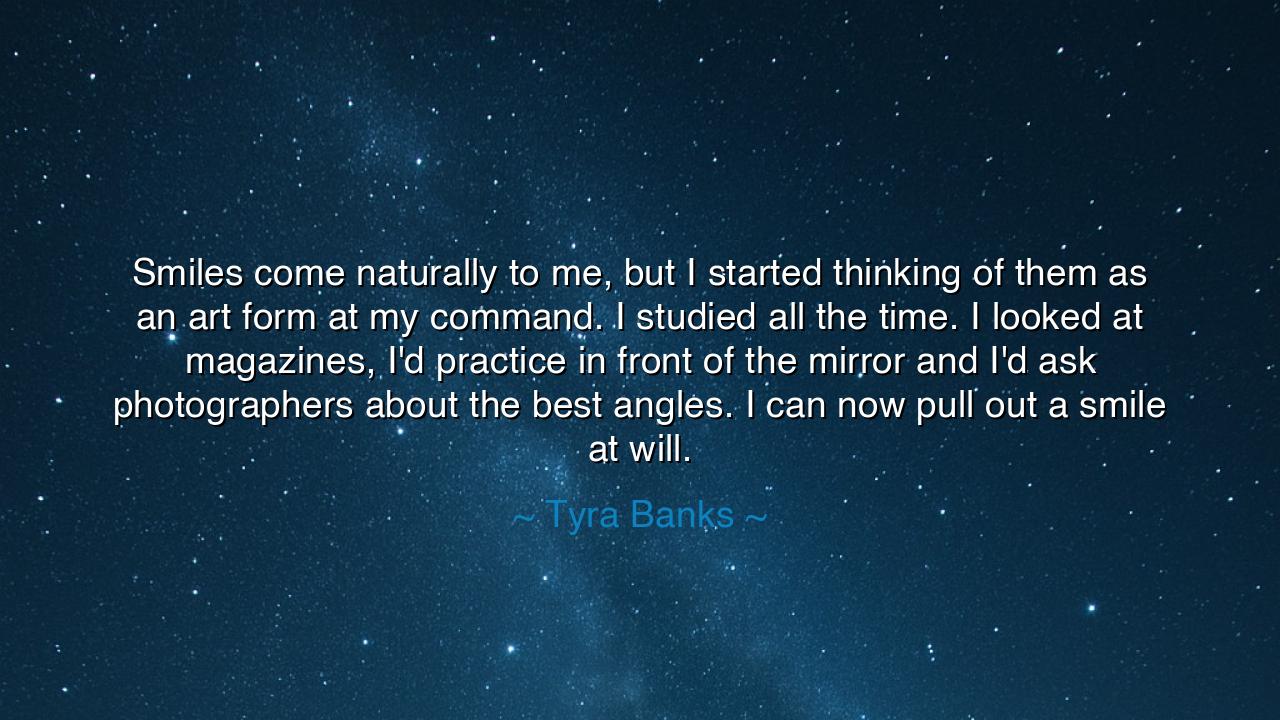
Smiles come naturally to me, but I started thinking of them as an
Smiles come naturally to me, but I started thinking of them as an art form at my command. I studied all the time. I looked at magazines, I'd practice in front of the mirror and I'd ask photographers about the best angles. I can now pull out a smile at will.






Hear, O children of time, the words of the radiant Tyra, who declared: “Smiles come naturally to me, but I began to see them as an art form at my command… I studied all the time… and now I can pull out a smile at will.” Though born in the world of fashion, where lights and cameras capture fleeting beauty, her saying reaches beyond that realm. It tells of discipline, of mastery, and of the sacred act of turning what is natural into something deliberate, honed, and powerful.
For what is a smile if not both gift and weapon? It flows from the heart like water from the spring, yet, in the hands of the wise, it may be shaped like a blade of tempered steel. Tyra’s words remind us that even what is freely given by nature must sometimes be refined through effort, so that it may serve us in the moments when life demands courage, grace, or persuasion. The ancients taught that the voice, the gesture, the bearing of the body—these could be trained to command kings or comfort the broken. In this same way, Tyra shows that the smile may be crafted as a tool of strength, not only an outpouring of chance joy.
Remember, then, the tale of Queen Cleopatra of Egypt, whose beauty has been sung through centuries. Yet those who stood before her did not only marvel at her face. They spoke of the way she wielded her expressions like a sovereign’s scepter. With but a glance or a well-placed smile, she bound men to her cause, softened enemies into allies, and carved her place among empires. She, like Tyra, understood that charm is not mere accident—it is discipline married to nature, power bound to intention.
Tyra’s journey is a reflection of this ancient wisdom. She did not rest in the comfort of natural beauty; she became a student of the mirror, a seeker of angles and light. She trained her smile as a warrior sharpens his blade. This is a lesson to all: do not rely only on what has been given. Instead, refine it, study it, and wield it with awareness, for untrained talent fades, but cultivated mastery endures.
Yet hear this caution: a false smile, without spirit behind it, is like a sword with no edge. It deceives no one for long. The true power of the practiced smile lies not in falsehood, but in the fusion of heart and craft. The actor who can weep on command, the orator who can thunder with practiced breath, the model who can shine under unyielding lights—all of them still draw upon an inner flame, or else their craft is but an empty shell.
Thus the teaching stands: life will demand from you moments where your heart falters, but your duty calls you to stand strong. In such moments, summon your trained smile, not as deceit, but as armor. Wear it to inspire those who look to you, to ease those who suffer, or to command respect when your spirit feels weak. In this way, the practiced smile becomes not a mask, but a shield and a gift.
Therefore, O traveler, do this: study yourself as Tyra studied the mirror. Learn your strengths, polish them until they shine even in shadow. Practice not only the smile, but also the word of kindness, the gesture of reassurance, the posture of confidence. When trial comes, these will be your ready tools, your “art forms at command.” And as you use them, let them never stray far from truth.
For the legacy of Tyra’s words is this: beauty and power are not merely bestowed, they are cultivated. To live with mastery is to take what is natural and refine it into art. Go forth, then, and let your smile—whether born of joy or of resolve—become a beacon, a command, and a timeless sign of your inner strength.






AAdministratorAdministrator
Welcome, honored guests. Please leave a comment, we will respond soon